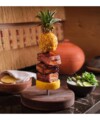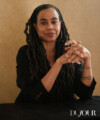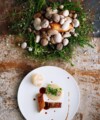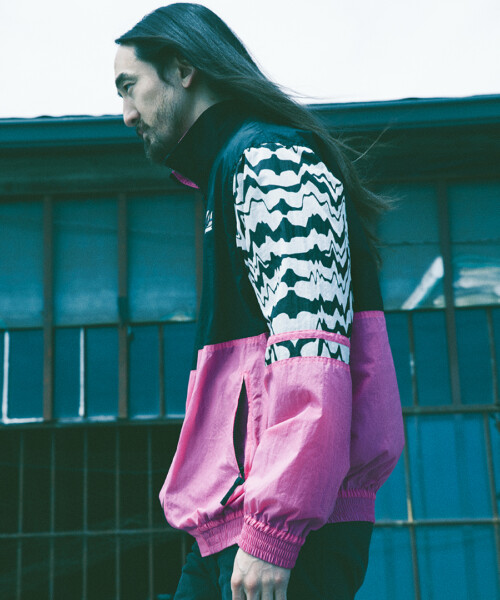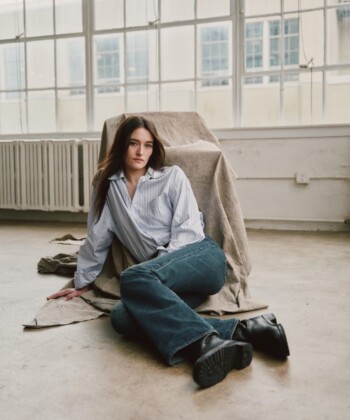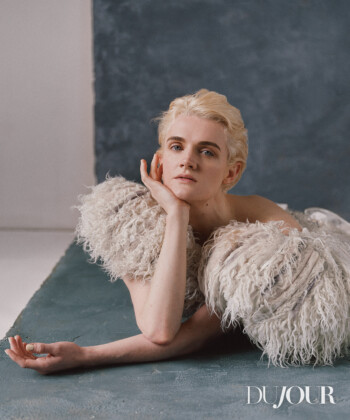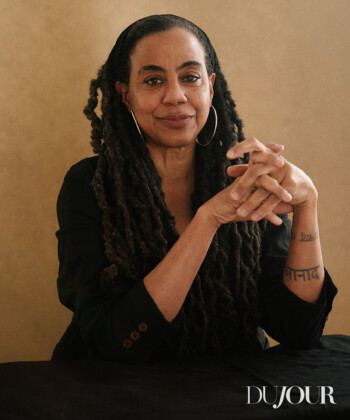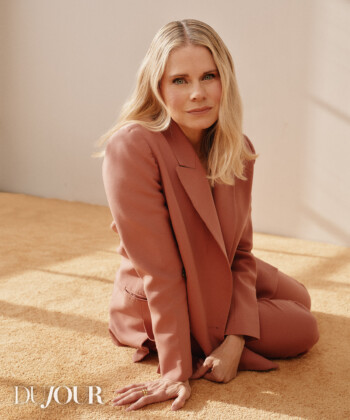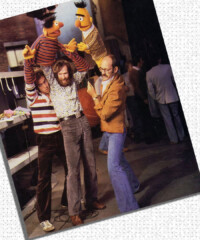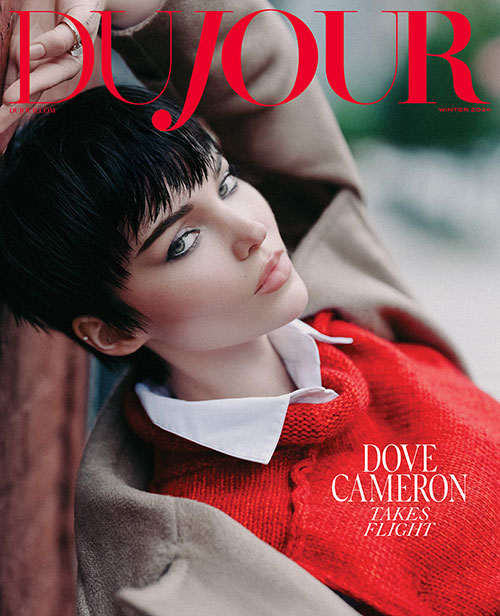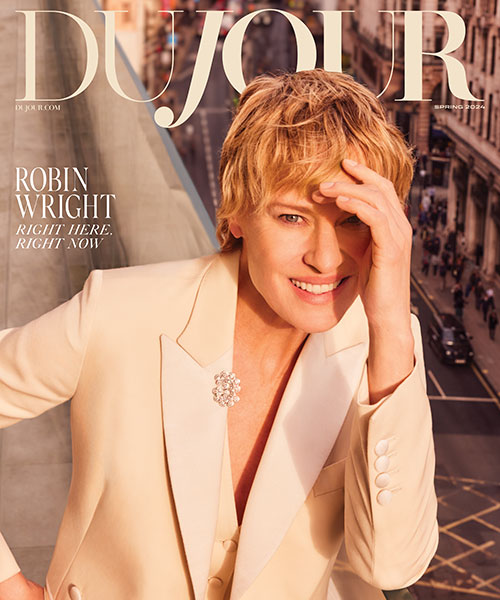I assumed that Steve Aoki would travel with an entourage in tow. He’s arguably one of the most epic performers in electronic dance music at the moment, offering heart-thumping beats and hours of euphoric thrills for his hardcore fans. What I didn’t expect was for him to request a Green Tea Frappuccino or to successfully complete a classic #AokiJump with the CEO of DuJour or to inform me that if he weren’t a Grammy-nominated music producer, he would have his PhD.
“There is no reason why you can’t do something,” Aoki leans in and says this with no hesitation. “If I gave you a guitar and six months to learn your favorite song, you will be able to. If you actually practice.”
The man is one of the world’s highest-grossing DJs, a humanitarian, has owned his record label, Dim Mak, since college and has made himself into a brand that’s celebrated across the globe. I guess I should trust his advice, right?
Aoki began in a straight-edge, hardcore scene, which he describes as “really loud, noisy music that’s all based on the DIY (do it yourself) idea.”
“This whole DIY mentality allowed me to express myself and learn things on my own. I have never been classically trained in anything,” Aoki reveals. “Even in business and fashion. I’m a designer but I never went to school for it. Almost everything I’ve done I’ve never been trained in, except for actual academics. I majored in women’s studies and sociology but never pursued social work professionally,” he says.
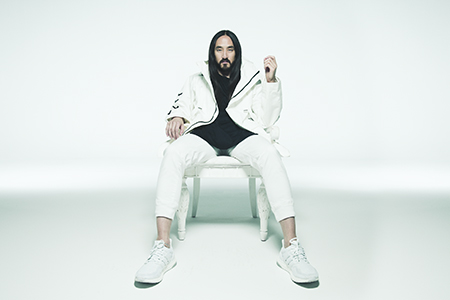
Steve Aoki
As a self-proclaimed feminist I’m infatuated by the fact that he majored in women’s studies and want to pick his brain. Instead, he continues to inspire me with his personal evolution into the iconic brand Steve Aoki is. “The foundation that I grew up on taught me that I could learn anything. If I picked something up, I could teach myself how to do something. I always had that feeling,” he tells me. Aoki graduated college and applied for several PhD programs. His heart was in the hardcore music scene though, which helped shape him into the go-getter he was clearly always destined to be.
“Music is a platform to speak about something. Whether it’s love or civil rights or whatever it may be, it’s a tool to communicate with others,” he says. “What I was learning in school was definitely informing my musical process. I would take that knowledge and put it into lyrics in a more civilized way,” he reminisces on his early days.
Instead of pursuing one of the many PhD programs he was accepted into, Aoki developed his record label, Dim Mak (named after his idol, Bruce Lee). He had $400 to his name and a lot of passion. “I got a memo from this band called The Kills, a rock and roll band from England. I had to make a decision between the grueling process of getting my PhD or trying to give something back through music,” he explains. He followed his heart and pursued music.
Within the following year, Aoki discovered a band called Bloc Party in England. The band catapulted Dim Mak into a real, successful business. “I was DJing on the side to pay for my label. People would come out to see The Killers perform and I’d be the opening DJ. I was happy if I got $150 for the night,” he says.
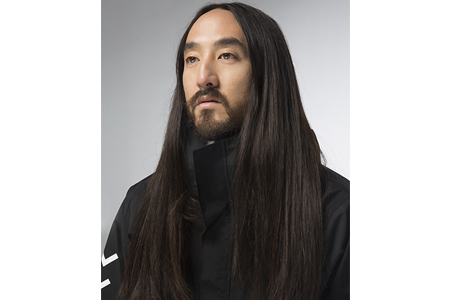
Steve Aoki
15 years later, Aoki is about to release his fourth studio album Kolony on July 21, which will feature dream collaborators such as T-Pain, Migos, Lil Yachty and 2 Chainz. As Aoki prepares to go out on the road and offer fans wild shows filled with champagne showers and entire sheet cakes launched into the crowd (yes, that is Aoki’s trademark), I can’t help but wonder what moved him to start caking his audience.
“In 2011 I caked someone in the face and the video went viral,” he says nonchalantly. “I always want a Steve Aoki show to be a musical experience. I’m constantly trying new things; one minute I’m pouring champagne over people’s heads then I’m bringing out the super-soakers. Some things work, others don’t. People love getting caked, though. I’ve caked over 20,000 people at this point. It’s my signature,” he concludes.
As far as Aoki’s inspiration, he draws from the classics like Michael Jackson, who also had a very distinct style, but the most influential set Aoki has experienced was Daft Punk at their epic Coachella 2006 performance. “They were sitting on this pyramid. Their heads were bobbing. From the music to the LED lights to the massive pyramid; I was hypnotized,” he shares. “They didn’t have to move and they were changing my soul. I think Daft Punk spearheaded a cultural shift for electronic music; making people see a DJ production as something that allows you to feel something so powerful.”
Steve Aoki is most definitely making people feel something, as well. His recent single “Just Hold On” featuring Louis Tomlinson of One Direction charted at Number One on the day it was released in 23 countries and gained over 230 million streams on Spotify. “It’s amazing that music is able to go beyond the night clubs and dance floors,” Aoki says before he and his entourage say goodbye to the DuJour offices.
Aoki and his entourage wind up staying for an impromptu photo shoot with the DuJour team. As I’m looking around at the ecstatic faces, people reminiscing on their first Steve Aoki show or how they’ve always wanted to see him live, I realize I’m seeing it first-hand how the music has transcended beyond the night clubs and dance floors and straight into our offices on what could’ve been a normal Monday morning.
Catch Steve Aoki performing at Tomorrowland in Belgium, Medusa Festival in Spain and Hakkasan in Las Vegas later this year. Maybe you’ll be one of the lucky ones to get caked.





